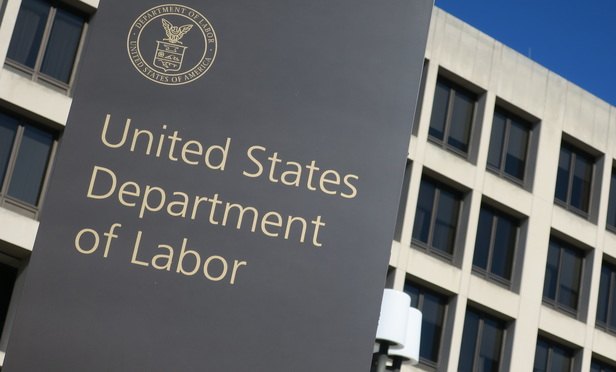
 Labor Department headquarters in Washington. (Photo: Mike Scarcella/ALM)
Labor Department headquarters in Washington. (Photo: Mike Scarcella/ALM)
The Labor Department said Friday that its fiduciary prohibited advice exemption to align with the Securities and Exchange Commission's Regulation Best Interest will go into effect Tuesday.
Labor's Employee Benefits Security Administration's PTE, called "Improving Investment Advice for Worker & Retirees," is "broadly aligned" with Reg BI, according to the Employee Benefits Security Administration.
In the coming days, EBSA said, it will publish related guidance for retirement investors, employee benefit plans and investment advice providers.
Ali Khawar, deputy assistant secretary of Labor for EBSA, said Friday in a statement that "this exemption allows for important investor protections, including a stringent 'best interest' standard of care for fiduciary recommendations of rollovers from ERISA-protected retirement accounts.
"We recognize that investment advice providers have been preparing for the exemption, and this step will allow them to implement important system changes. That said, we will continue our stakeholder outreach to determine how we might improve this exemption, the rule defining who is an investment advice fiduciary, and related exemptions to build on this approach."
ERISA attorney Fred Reish of Faegre Drinker told ThinkAdvisor Friday in an email that over the past few weeks, "Labor has been having remote meetings with representatives of financial sector trade associations and consumer groups, asking whether the rule should be allowed to go into effect. Many of those representatives recommended that the rule be allowed to go into effect."
The groups, Reish said, "felt that they could live with the rule and were concerned that a delay could result in a harsher rule. The consumer groups felt that the rule was fairly robust, though not perfect. However, they believed that later this year the DOL would begin work on a more robust fiduciary definition and that would cover their concerns."
The exemption "permits conflicted compensation, for example, commissions, for fiduciary advice to retirement plans, participants and IRAs."



